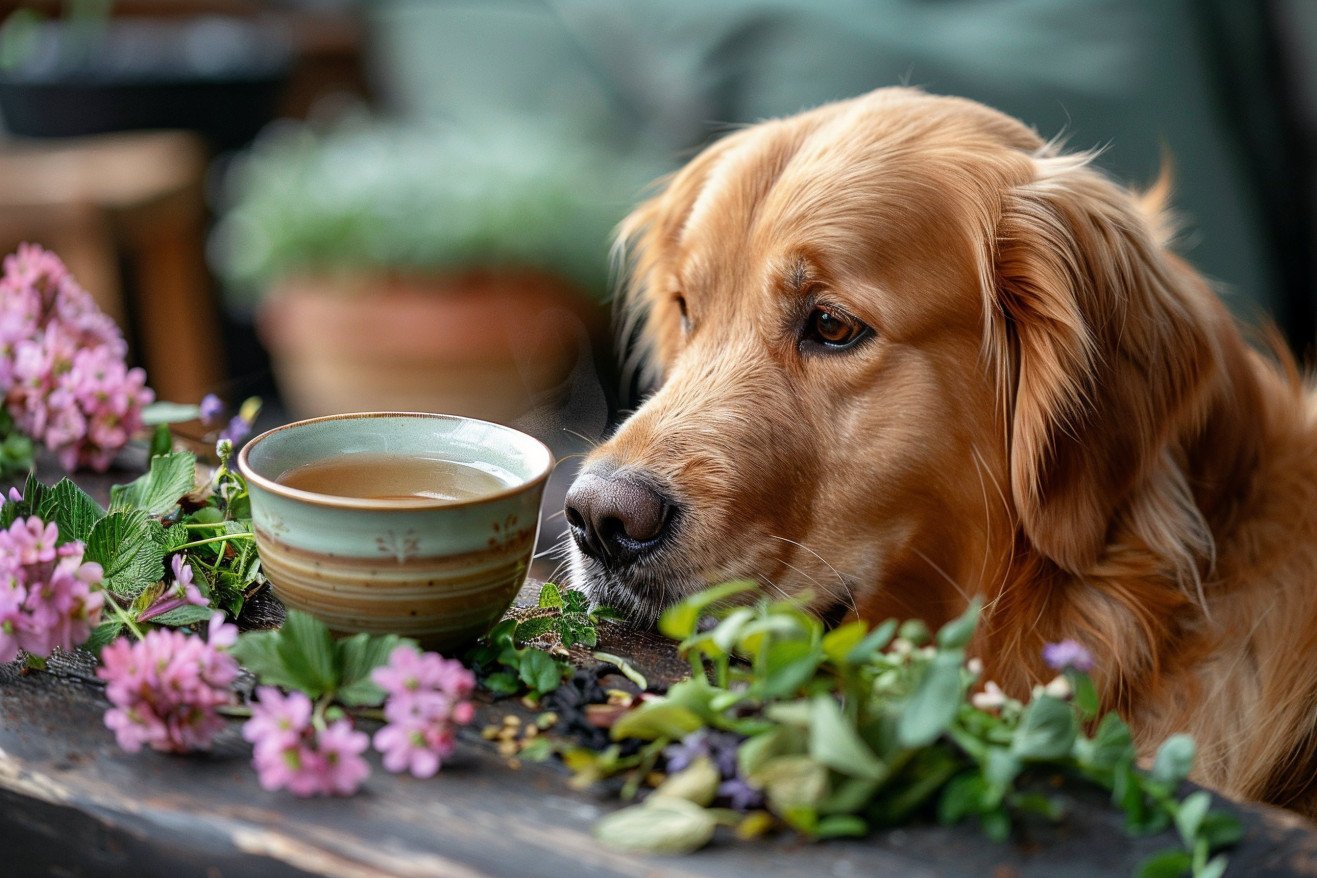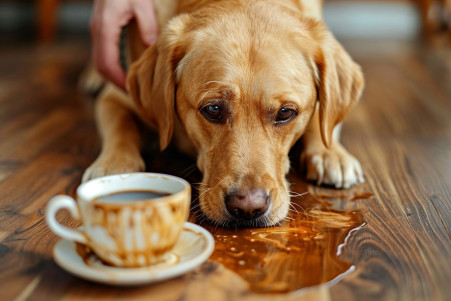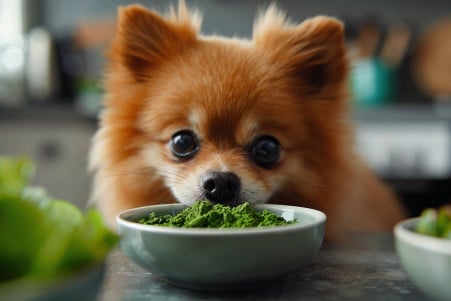Can Dogs Drink Tea? Understanding the Risks and Safe Alternatives
22 February 2024 • Updated 22 February 2024

If you’re sipping a cup of tea, you may be wondering if your dog can have some too. Dogs should not have tea that contains caffeine, which is toxic to dogs and can cause symptoms like restlessness and heart palpitations. Some herbal teas, like chamomile or rooibos, may be okay in small amounts, but you should always ask your vet first. However, when it comes to hydration, nothing beats plain water for dogs.
In this deep dive into dog nutrition and health, we’ll take a look at a number of scientific and veterinary studies that have investigated the impact of tea on dogs. Veterinary medicine, toxicology, and animal nutrition researchers have all looked into the potential risks and benefits of feeding tea to dogs. This article will summarize what they’ve found, shedding light on what makes a healthy and safe diet for dogs.
Can dogs drink tea?
Caffeine Is Toxic to Dogs
Tea drinkers may be shocked to learn that their favorite beverage can be toxic to their furry friends. Caffeine is toxic to dogs because it stimulates the central nervous system, which dogs are more sensitive to than humans, according to MasterClass.
If a dog consumes caffeine, it can cause symptoms such as an increased heart rate, hyperactivity, restlessness, and in more severe cases, vomiting and an elevated body temperature, according to DogTime. Ingesting caffeine can also cause abnormal heart rhythms, rapid breathing, and high blood pressure, which can lead to a coma or death.
This risk isn’t just limited to regular tea; decaffeinated teas can still contain caffeine. According to Holidays4Dogs, dogs metabolize caffeine differently than humans, so even small amounts can be dangerous to them.
If a dog ingests caffeine, it’s important to get them to a veterinarian right away. Treatment for caffeine poisoning can include the administration of activated charcoal, vomiting, and intravenous fluids. Knowing this can help dog owners avoid potentially life-threatening situations caused by caffeine toxicity.
Herbal Teas and Canine Health
In the world of dog-friendly drinks, a few herbal teas stand out as safe and potentially helpful options for dogs. Rooibos tea, for example, is a caffeine-free tea that is full of antioxidants that can help boost the immune system and improve overall health.
According to Animal Wellness Magazine, rooibos, also known as African Red Bush, can help with allergies and digestive problems in dogs, and its anti-inflammatory properties mean it can be used topically to help soothe skin issues.
Chamomile tea, which is known for its relaxing properties in humans, also has a calming effect in dogs. According to Felcana, chamomile is a natural sedative that can help dogs relax and maintain healthy digestion. Peppermint tea can help freshen breath and soothe digestive problems, while ginger tea can help with nausea and has anti-inflammatory properties.
If you decide to give your dog herbal teas, make sure the tea is at room temperature to avoid burning your dog’s mouth and don’t add milk or sugar, which can cause digestive upset and other health issues.
Use herbal teas in moderation, giving them to your dog as an occasional treat rather than a regular part of their diet. This is an example of how to make sure you’re being mindful of your dog’s digestive system when choosing their drinks, which we’ll discuss next.
How the Dog Digestive System Works
The canine digestive system is a highly specialized system that is well adapted to breaking down food and expelling waste. According to Washington State University, the process starts with the mouth and teeth, which chew the food and are aided by the salivary glands. The food then moves through the esophagus to the stomach, where the stomach’s glands help with digestion by producing important digestive enzymes.
A paper in PMC by Sylvain Denis goes into more detail about the system, noting that it is adapted for a facultative carnivorous diet, which means that it is much shorter and simpler than the digestive tracts of omnivores and herbivores. The small intestine, pancreas, and liver are responsible for digestion and nutrient absorption, while the large intestine is responsible for absorbing water and electrolytes.
Tea and its components can affect the dog digestive system in a number of ways. For example, the caffeine in regular tea can overstimulate the system and cause toxicity, but some components of herbal teas may be helpful, such as supporting digestion or providing antioxidants without overloading the system.
As a result, while some teas can be toxic because the dog digestive system can’t handle them, others can be helpful if they are selected based on the dog’s digestive system and overall health. This is important because what dogs consume directly impacts their hydration and health.
Where Hydration Fits Into Your Dog’s Overall Health
Hydration is one of the most important factors in your dog’s overall health. As Hills Pet pointed out, a dog’s body is made up of 60 to 70% water, and that water is necessary for a number of bodily functions. It helps with digestion, regulates body temperature, and aids in the absorption of nutrients and the excretion of waste.
While safe herbal teas may have some other health benefits, it’s important to note that they should never be used as a replacement for water in your dog’s diet.
Dehydration in dogs happens when a dog loses more water than they’re taking in, and it can lead to some very serious health problems, including organ failure and electrolyte imbalances.
Some of the signs of dehydration include dry gums, lethargy, and sunken eyes. As Dr. Sarah Wooten noted, dogs need to take in about 1 ounce of water per pound of body weight every day, and that’s important for preventing dehydration and keeping them healthy overall.
Water is still the undisputed best way to keep your dog hydrated, and it’s the most important thing you can do to make sure they stay healthy and happy. Always make sure that your dog has access to fresh, clean water at all times.
While herbal remedies have a place in veterinary medicine, it’s important to remember that they can be used in addition to—and never in place of—water in your dog’s diet.
The Role of Herbal Teas in Modern Veterinary Medicine
The potential of herbal teas to address common health concerns in dogs is increasingly being recognized in veterinary medicine.
For example, a systematic review in BMC Veterinary Research demonstrated that plants like chamomile and marigold, which have long been used in traditional medicine to help heal wounds, can be useful in the treatment of dermatological conditions in dogs due to their anti-inflammatory and antibacterial properties.
Meanwhile, the Veterinary Herbal Medicine session, as outlined by VIN, shows that there is a growing body of research supporting the use of herbs like ginger and peppermint, which are commonly found in herbal teas, to treat animal health issues.
In addition, the use of phytotherapy by veterinary professionals in Spain, which was documented in a cross-sectional survey in PMC, is part of a larger trend in Europe. The results of the survey showed that the use of certain herbal remedies, including those found in herbal teas that are safe for dogs, is on the rise because they are perceived as being more effective and safer than synthetic drugs.
The fact that herbal teas are being used in veterinary medicine demonstrates a willingness to embrace the potential of herbal teas to improve canine health, as long as they are used responsibly under the care of a professional. This is part of a larger movement to integrate natural therapies into veterinary medicine, which is helping to establish a framework for the responsible and accepted use of certain herbal teas for dogs.
Conclusion: Can Dogs Drink Tea?
So, can dogs drink tea? In our investigation of whether dogs can partake in tea time, we’ve learned that caffeinated teas can be dangerous for dogs, leading to symptoms such as hyperactivity, gastrointestinal distress, and more serious issues due to their sensitivity to caffeine.
On the other hand, some herbal teas, like chamomile and rooibos, can be beneficial, helping with digestion and skin problems, as long as they are used in moderation and don’t contain any other ingredients.
That said, the bottom line is clear: Always talk to your vet before giving your dog any kind of tea. They can help you figure out if and how you should give your dog tea based on their individual health and dietary needs.
While we’ve looked at the potential benefits of herbal teas as an occasional treat or remedy, it’s important to remember that water is the most important source of hydration for dogs. Make sure your dog always has access to fresh, clean water. In the end, keeping our dogs’ diets safe and healthy means sticking with what we know and being careful and consulting with a professional when we want to try something new.


